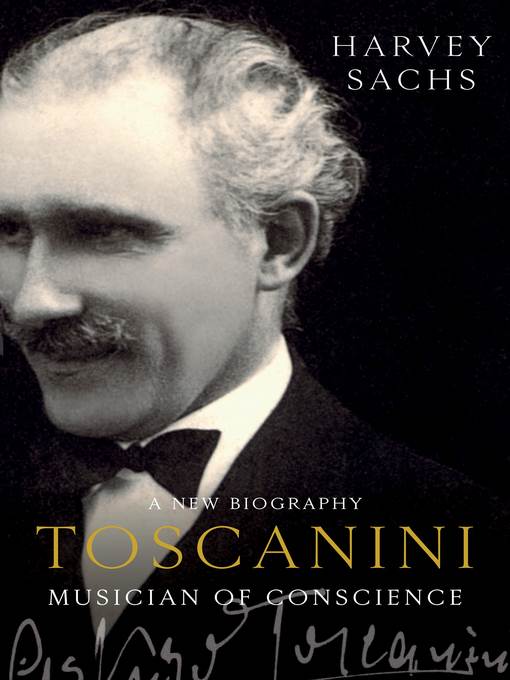
Toscanini
Musician of Conscience
کتاب های مرتبط
- اطلاعات
- نقد و بررسی
- دیدگاه کاربران
نقد و بررسی

Starred review from January 23, 2017
Sachs vibrantly and vividly narrates the sprawling tales of Italian conductor Arturo Toscanini’s passionate life, drawing on a treasure trove of newly available material: almost 1,500 letters, more than 100 tape recordings of Toscanini in conversation with his family and friends during the last years of his life, and archives of institutions with which Toscanini was deeply involved, such as La Scala and the Met. In exhaustive detail, Sachs begins with Toscanini’s birth in Parma in 1867 and energetically chronicles his student days; his marriage; his remaking of La Scala; his tenure at New York City’s Metropolitan Opera; his opposition to Mussolini; his years at the New York Philharmonic, Bayreuth, Paris, and Salzburg; and his death, just a few months before his 90th birthday. Toscanini emerges as a creative genius possessing an “extraordinary aural memory” that allowed him to recall pieces of music that he had heard but whose scores he had never seen. On tour with an opera company to São Paulo as assistant chorus master and principal cello when he was 19, Toscanini was thrust onto the conductor’s podium one evening when the crowd rejected the principal conductor; it was Toscanini’s remarkable debut. Sachs’s entertaining and definitive portrait of Toscanini reveals a passionate musician characterized by intense concentration, personal magnetism, generosity, and commitment to his country and his family.

Starred review from May 1, 2017
The epic life and art of the famed Italian conductor.In his lifetime, Arturo Toscanini (1867-1957) was considered the greatest conductor of all, and music historian Sachs (Curtis Institute of Music; The Ninth: Beethoven and the World in 1824, 2010, etc.) makes a strong case for that assessment with judicious quotations from contemporary sources. They reveal an exacting taskmaster, feared for his brutal criticisms of singers and orchestra members, who could also be a gentle instructor and a steadfast support--if he felt they were working hard enough. He drove no one harder than himself: a musical prodigy from a family in straitened circumstances, Toscanini won admittance to Parma's prestigious Royal School of Music when he was 9 and conducted his first orchestra at 19. He gained early success in opera, serving as chief conductor of La Scala in Milan and then New York's Metropolitan Opera, but he achieved his broadest popular reach leading the NBC Symphony Orchestra's weekly radio broadcasts beginning in 1937. He awed performers and audiences by conducting without a score and was revered for his attention to detail and fidelity to the composer's intentions. Sachs creates a well-rounded portrait of this admirable artist and not entirely admirable man, noting that Toscanini proclaimed devotion to his wife while philandering well into his 70s. The biographer has nothing but admiration, however, for Toscanini's principled anti-fascism, which led him to leave La Scala and to refuse to continue at Bayreuth, where he was the first non-German conductor. The author also praises Toscanini in his prime as an advocate for new music and living composers; if the conductor's tastes grew more conservative over time, Sachs reminds us that this was part of a broader trend, as classical music and opera receded from the mainstream to rely on an established, mostly 19th-century canon. This minutely detailed chronicle of Toscanini's jam-packed life offers more than casual readers will want to know, but music lovers will savor every evocative word. Sweeping yet meticulous, appreciative without eschewing critical judgments--like Toscanini himself.
COPYRIGHT(2017) Kirkus Reviews, ALL RIGHTS RESERVED.

Starred review from February 1, 2017
The name Toscanini once struck fear in the hearts of musicians and awe in the hearts of his audiences. During his turbulent lifetime Arturo Toscanini (1867-1957) knew many famous composers, including Giuseppi Verdi, Giacomo Puccini, and Richard Strauss, and was influential in the interpretation of their works. His photographic memory enabled him to conduct without a score, and his exacting standards influenced reforms in the opera house and concert hall. Sachs, who is on the faculty of the Curtis Institute of Music, wrote an earlier biography of his subject, but this completely new edition draws on the archives of such venerable institutions as Milan's La Scala, New York's Metropolitan Opera, and the New York Philharmonic, as well as the Toscanini family's archive and the 1,500 letters that the author edited, translated, and annotated and published in 2002, as The Letters of Arturo Toscanini. Sachs blends his tale of the maestro's career with copious details of his private life, including Toscanini's affairs and his courageous stand against Fascism and Nazism. VERDICT There is a wealth of information here for musicologists. Sachs's engaging account should also attract general readers interested in the subject. Highly recommended.--Edward B. Cone, New York
Copyright 2017 Library Journal, LLC Used with permission.

May 1, 2017
So much more about the great conductor Toscanini has been garnered since Sachs' famous 1978 biography that this one completely supplants it without, Sachs says, repeating one whole sentence from its predecessor. Such riches of resource conduce to 992 pages of incident and observation, recording seemingly every opera and concert, every composition, every soloist, vocal and instrumental, that the maestro guided in performance. The son of a struggling, hitherto-unmusical lower-middle-class family, Toscanini possessed an eidetic musical memory, and he conducted all rehearsals as well as public performances from memory. He began his conducting career at 19 and concluded 68 years later, having brought three great musical organizationsMilan's La Scala opera, New York's Metropolitan Opera, and the New York Philharmonic Orchestrato peak performance quality and transformed the presentation of opera, in particular. He was the most famous Italian of his lifetime, so beloved that Mussolini dared not silence his ferocious anti-Fascism. And he was adulterous with many of the comeliest sopranos of the century. Historically minded classical-music lovers will revel in this accessible, exhaustive life chronicle.(Reprinted with permission of Booklist, copyright 2017, American Library Association.)

























دیدگاه کاربران